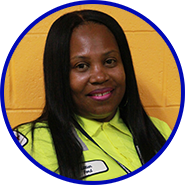Cheri Douglas, Towing Supervisor, Parking Enforcement Management Administration
After close to 10 years as a parking enforcement officer, Cheri Douglas transitioned in 2013 to a tow truck (aka crane) operator. Last May she made DPW history by becoming the first female Towing Supervisor. She has oversight responsibilities for a squad of 13 men and 2 women. “They tell me I’m the best supervisor they ever had,” said Douglas. “They know I’m fair and that I have their best interests at heart. I ask my team for input and when they make good suggestions, I give them credit for it and let everyone know who suggested it.” While Douglas says it hasn’t always been easy being a woman in a non-traditional job, she’s experienced phenomenal personal growth through her work. “I’ve learned so much about myself. It’s been a humbling experience,” she said. Her family and friends tell her they’ve also seen a difference. “I don’t take things personally anymore,” said Douglas. She has also learned how to communicate with people who may be defensive and to recognize that every situation is different.
 Suzette Robinson – Administrator, Fleet Management Administration
Suzette Robinson – Administrator, Fleet Management Administration
Women working in the transportation and construction industries were considered nontraditional in the 1990s, and “we still are today,” said Suzette Robinson. In 1985, she was the first-ever African American woman to graduate from the Illinois State University with a B.S. in Physics. From there she went straight to a supervisory role at Chicago’s Midway Airport. Other career highlights include serving for 6 years as the DPW director for Evanston, IL. Robinson came to the District in 2015 to work as DDOT’s chief operating officer before taking on DPW’s Fleet. “It’s been both exhilarating and stressful at the same time,” she said, to be a leader in a nontraditional setting. Along the way, her women friends have been her sounding board and invaluable mentors. Pro tip: “Women are competitive; your mentor should be someone who is not on the same career path as you are.” Robinson, a retired Navy reserve officer, has a grown daughter and son. Her daughter is attending the Naval Academy in Annapolis.
 Lillian Ford – Sweeper Operator, SWMA, Street and Alley Cleaning Division
Lillian Ford – Sweeper Operator, SWMA, Street and Alley Cleaning Division
When Leaf Season rolls around in the District each fall, DPW hires temporary workers to help the agency’s existing staff collect more than 7,000 tons of leaves. The job is full time for 90 days. For Lillian Ford, in 2000, it was a second full time job to supplement the income she received from a retail position she worked in the evenings and on weekends. She was hired in a permanent DPW position after working four leaf seasons. When she started out she was one of four women on a crew of about 30 men. Now, as a sweeper operator, a light plow operator during snow events, and a member of the grounds maintenance crew during the summer, the ratio of women to men is about the same. “Men will always outnumber the women at DPW,” Ford said. “We just can’t let ourselves be distracted by the men, and don’t let anyone tell you you can’t do something.” Through classes and hands-on training provided by DPW management, Ford has learned to operate a leaf vacuum and push snow in a light plow truck. She can use all the cutting equipment for grounds maintenance and drive the riding lawn mower. “I’ve learned I can do things I never thought possible for me.”
 Octavia French – Sanitation Tech, SWMA, Collections Division
Octavia French – Sanitation Tech, SWMA, Collections Division
Octavia French found DPW through DC Career Connections, a Department of Employment Services work readiness program for out-of-school and unemployed young adults between the ages of 20-24. “I was the first female they sent to work at DPW,” she said. Since 2013, she’s worked in every SWMA yard except graffiti removal. Her first assignment was at RFK stadium, cleaning out dump trucks with a power washer. Next she worked leaf season and received a positive evaluation that got her transferred to grounds maintenance, then SACD special assignments and finally trash collections, where she’s been for the last 2 plus years. “When I went to trash, the men at W Street said I was too small to do the job.” Standing 5 feet 5 inches tall and weighing in at 110 pounds, French was not surprised by the remark. As a sanitation tech, she picks up trash containers and dumps them into the truck. “It was hard, but I stuck to it and got pretty good,” she said. “Now they have to keep up with me.” French is evaluated on her work performance every six months. She would tell anyone who wants to succeed in the job, “Don’t fold under pressure, just stick to it.”
 Euniqua Harden – Sanitation Tech, SWMA, Collections Division
Euniqua Harden – Sanitation Tech, SWMA, Collections Division
Jumping on and off the back of a trash truck, hoisting trash and recycle containers into the back of it is hard work. “Some men can’t do what we do,” said Euniqua Harden. When she told her family and friends what she was doing, no one believed her. But she enjoys getting up early to start work at 6 am, avoiding rush hour traffic, and getting out there in the cold while others sleep. Her first day on the back of a trash truck included warnings about the rats she might see. “That was scary,” she said, but she learned not to run from the rats. “It’s for my own safety. I could be running from them and get hit by a car going by.” Assigned now to office duties since she became pregnant, she is honored as a woman who can do the job of sanitation tech. Her first assignment at DPW in 2015 was a summer job through the Department of Employment Services Career Connections program. Harden received training on using weed wackers and bush trimming equipment and worked on the grounds maintenance crew, which included picking up trash on the highways DPW cleans. There was a group of 20-30 people who came through the Career Connections program, Harden said, but only a few were kept on or stayed at DPW. She worked leaf collections and alley cleaning before becoming a sanitation tech.
 Cynthia Jones – Program Manager, Abandoned Vehicle Operation, Parking Enforcement Management Administration
Cynthia Jones – Program Manager, Abandoned Vehicle Operation, Parking Enforcement Management Administration
In 1978, when Cynthia Jones started her career with DPW Parking Enforcement, the term “meter maid” was still in use to refer to female parking enforcement officers. “In DC we were called Ambassadors to the City,” she said. The job title at the time was Parking Control Aide. There were no automated systems or handheld devices for recording parking tickets; the parking aides wrote tickets out with a pen on ticket books with carbon paper. “We wore bright blue uniforms with white shirts and navy blue and white hats. Our shirts always had stains from the carbon paper.” When Jones became a parking supervisor, she was the only woman in a supervisory role at PEMA. Following a stint as a parking analyst surveying turnover of parking spaces in the central business district, Jones had the opportunity to work with the Abandoned Vehicle Division. From 2003-2007, she was the first and only woman to serve as a live auctioneer, standing on the back of a pick-up truck calling out the vehicles and the bids. The auctions have since migrated to GovDeals on the internet. Her advice to DPW women today is “always share your knowledge with others and stay steadfast, strong and confident in your ability to make decisions.”
 Latisha Huntley – Supervisor, Street and Alley Cleaning Division
Latisha Huntley – Supervisor, Street and Alley Cleaning Division
Latisha Huntley started out in DC government at the Department of Public Works in 2000 as an office clerk in Special Operations of Street and Alley Cleaning Division. “I always thought I wanted an office job where I could wear nice clothes,” she said. It took just a couple of years before she knew she wanted to get out into the field and moved to a position as a sanitation tech in SACD assisting dump truck drivers. “I was one of the crew getting out of the truck to sweep the alley or rake leaves.” Two years later, Huntley got her CDL license and then worked her way up to a supervisor position, a position she has held for the past 15 years. How does she handle overseeing crews of mostly men? By enforcing the rules and earning the crew’s respect, she said.
 Kathy Harrison-Crews – ROSA Team Coordinator, Parking Enforcement Management Administration
Kathy Harrison-Crews – ROSA Team Coordinator, Parking Enforcement Management Administration
Kathy Harrison-Crews attributes her success as a woman supervisor in a male-dominated workforce to having an open mind, patience, staying humble and strong. “It’s easy for someone to take you out of your character,” she said. As coordinator of the ROSA team for the past 8 years, Harrison-Crews supervises a team that roams the city overnight to identify vehicles parked on public space that may be in violation of District registration requirements. Whether she’s handling irate citizens or irate employees – she has encountered both – her approach is to stand her ground. Starting out with DPW in 1997, she worked for 4 years as an enforcement officer before she became shift coordinator, a position she held for 9 years prior to heading up the ROSA team. Harrison-Crews said she made it part of her job to educate herself about District regulations. “Knowing the regulations gives me support for whatever I’m doing and the leverage I need to stand my ground. I’m not insecure about what I’m doing.”
 Irene Jordan–Direct Maintenance Repair Manager, Fleet Management Administration
Irene Jordan–Direct Maintenance Repair Manager, Fleet Management Administration
Women auto mechanics were somewhat rare in the 1980s when Irene Jordan chose the field for her career. She had tried and rejected women’s traditional roles in the secretarial field. “I didn’t see a path to make money and I didn’t enjoy the work. It wasn’t challenging. I knew I was mechanically inclined, so I decided to take a chance.” She attended Armstrong Adult Education Center in Auto Body Repair (only because she couldn’t get into the Automotive Repair classes because men kept the classes full) and then worked as an instructional aid in body repair at the University of DC. When she got her first job as a mechanic in 1988 with DC Public Schools, her male coworkers laughed and told her she could do their paperwork. Jordan became an ASE certified mechanic and started with DPW at Fleet in 2002. She was one of two women mechanics in a staff of about 50. In 2014, Jordan became a manager at Fleet. Today, when new mechanics join her team “they have to learn that I know what I’m talking about. If I was a man, they would assume it,” Jordan said. Automotive repair remains a non-traditional role for women and a challenging path. There are still only two women mechanics on Jordan’s team. Regardless, Jordan is “absolutely happy with the choice I made in the 80s.”
 Darlene Mungin- Administrative Officer and Fleet Advisory Service Manager
Darlene Mungin- Administrative Officer and Fleet Advisory Service Manager
Prior to joining the Fleet management team in 2016, Darlene Mungin worked at PEMA for 13 years as a program support analyst. There are a lot of women in DPW management, Mungin said, and they have helped her succeed. But it was the men on the floor at Fleet – the mechanics and inspectors – who got to know and appreciate her somewhat demanding, but honest and direct style. They convinced her to work at Fleet. “Your office is ready, they would tell me.” Fleet maintains the vehicles used in all DC government agencies, except Fire/EMS and MPD. As a budget and finance person at PEMA, Mungin visited Fleet often looking after PEMA vehicles. Now she looks after the Fleet budget and customer service. “When I went to Fleet, I explained I was the same person as before, but now I’m here to manage.” So far, she hasn’t had to look back. She promised the workforce she would build an inspection booth on the shop floor – a safe, contained, clean office space to help inspectors improve the work flow, and she delivered. She helped increase the amount of preventive maintenance work in the shop to 62 percent, up from 19 percent in the first year she was there.



